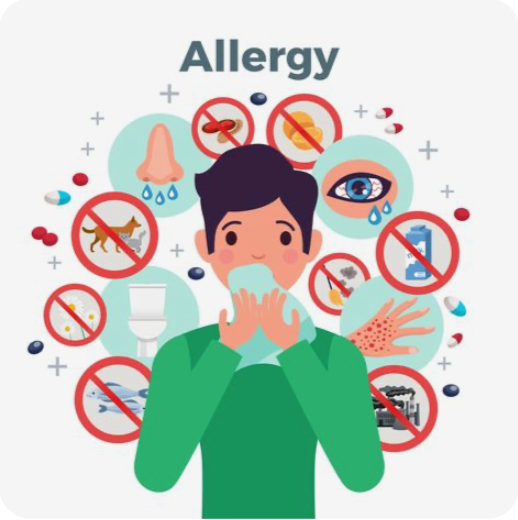Allergy Care (Food / Seasonal)
Personalized diagnosis and treatment for allergies—minimizing reactions and improving quality of life.
Allergies (Food & Seasonal)
What Are Allergies?
Allergies occur when the immune system reacts abnormally to a normally harmless substance—such as pollen, food, or pet dander—triggering a chain reaction of immune responses. It’s not the allergen itself, but the body’s overactive immune response that causes allergic symptoms, which can range from mild irritation to severe, life-threatening reactions like anaphylaxis.
Allergies are extremely common and affect people of all ages. Millions of Americans suffer from seasonal allergies (such as hay fever) and food allergies, which can significantly impact daily life.

Common Causes of Allergies
Allergic reactions vary widely from person to person and can be triggered by:
- Food allergens (e.g., peanuts, shellfish, dairy, wheat)
- Environmental allergens (e.g., pollen, mold, dust mites, pet dander)
- Medications (e.g., penicillin, sulfa drugs)
- Insect stings or bites
- Materials (e.g., latex, certain fabrics)
Some allergens may not cause a reaction until you are exposed multiple times.
Symptoms of Allergies
Symptoms can range from mild to severe, depending on the individual and the allergen. Common signs include:
- Sneezing
- Runny or congested nose
- Itchy or watery eyes
- Coughing or wheezing
- Skin rash or hives
- Swelling of the lips, tongue, throat, or face
- Difficulty breathing (in severe reactions)
- Anaphylaxis (life-threatening and requires immediate treatment)
Risk Factors
You may be at a higher risk of developing allergies if you:
- Have a family history of allergies or asthma
- Are a child or young adult
- Have certain medical conditions, such as eczema or asthma
- Are repeatedly exposed to allergens over time
Diagnosis: How Are Allergies Identified?
Diagnosing allergies involves one or more of the following:
1. Skin Testing
A small amount of an allergen is introduced just under the skin to observe for any reaction (redness, itching, swelling). This test is safe, quick, and widely used for a broad range of allergens.
2. Blood Testing
Used when there is a risk of a severe reaction to skin testing. This test measures the levels of allergen-specific antibodies (IgE) in your blood.
3. Elimination Diet
For food allergies, your doctor may recommend removing certain foods from your diet, then slowly reintroducing them to pinpoint triggers.
Treatment Options for Allergies
Treatment depends on the type and severity of your allergy. Options include:
- Prescription or over-the-counter antihistamines to reduce symptoms
- Nasal corticosteroids for congestion
- Decongestants for temporary relief
- Epinephrine (EpiPen) for severe, life-threatening allergic reactions
- Allergy shots (immunotherapy) for long-term relief from environmental allergies
Avoiding known allergens is the most effective way to prevent reactions. Our doctors will work with you to create a personalized treatment plan based on your specific allergies.
Prevention: Can Allergies Be Avoided?
While not all allergies can be completely avoided, you can significantly reduce your risk by:
- Keeping windows closed during pollen seasons
- Using air purifiers and allergen-proof bedding
- Reading food labels carefully
- Carrying emergency medication if you are at risk of anaphylaxis
- Regular check-ups with an allergy specialist
Risks of Untreated Allergies
Untreated allergies can lead to serious complications, including:
- Chronic sinus infections
- Asthma flare-ups
- Anaphylaxis, a medical emergency that can cause death if not treated immediately
Key Takeaways
- Allergies are an immune system overreaction to otherwise harmless substances.
- Symptoms range from mild (sneezing, itching) to severe (anaphylaxis).
- Diagnosis involves skin testing, blood tests, or elimination diets.
- Effective treatment plans may include medication, allergen avoidance, and lifestyle modifications.
- Severe allergic reactions are medical emergencies—always seek immediate help if symptoms escalate.
Take Control of Your Allergies Today
If you suffer from food or seasonal allergies, don’t wait. Early diagnosis and treatment can prevent serious complications and improve your quality of life. Our expert team of physicians is here to help you identify triggers, manage symptoms, and live allergy-free.
Schedule your allergy consultation today to start breathing easier and living better.
